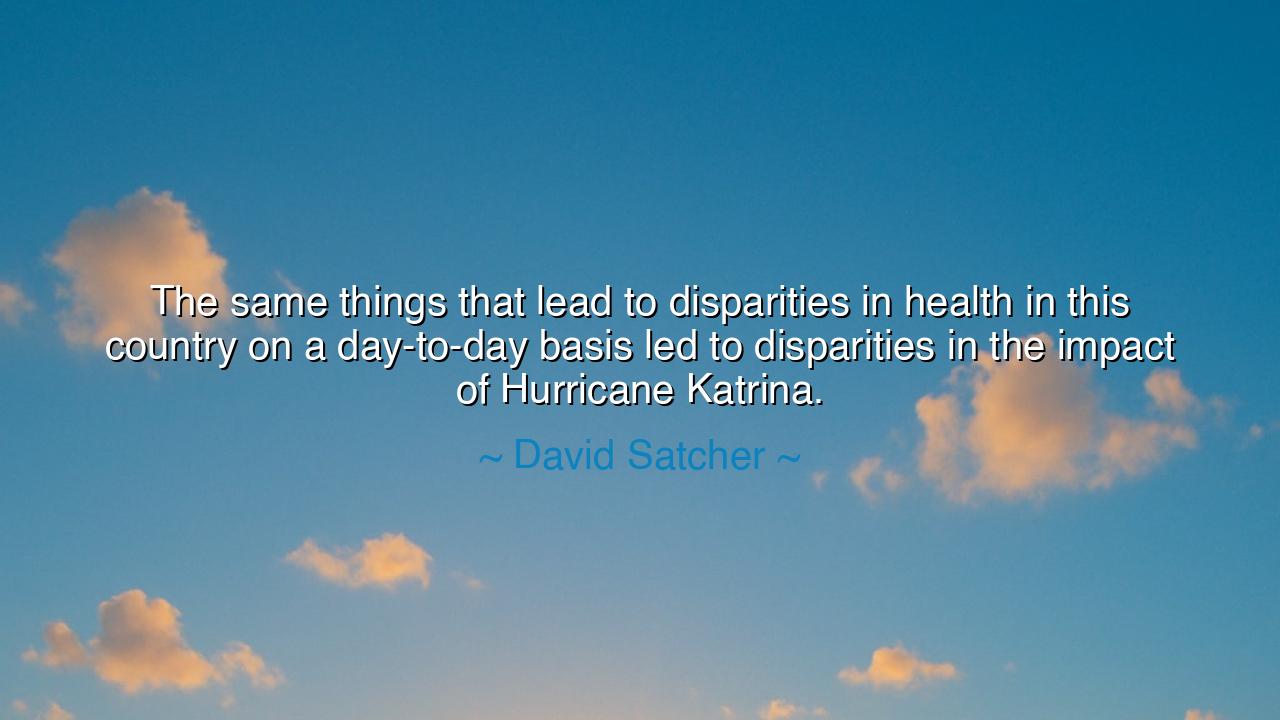
The same things that lead to disparities in health in this
The same things that lead to disparities in health in this country on a day-to-day basis led to disparities in the impact of Hurricane Katrina.






The words of David Satcher—“The same things that lead to disparities in health in this country on a day-to-day basis led to disparities in the impact of Hurricane Katrina.”—resonate with profound insight into the interconnectedness of social systems, inequality, and human vulnerability. Satcher illuminates a truth as ancient as civilization itself: inequities do not vanish in moments of disaster; they are magnified, exposed, and often catastrophic. The forces that shape daily life—poverty, limited access to healthcare, inadequate housing, and social marginalization—also determine how communities withstand crises, revealing the structural fragility beneath the surface of society.
In these words, we perceive the timeless lesson that preparedness and resilience are inseparable from justice. Those who are marginalized in ordinary times are often the most vulnerable in extraordinary circumstances. In the aftermath of Hurricane Katrina, communities already facing health disparities, economic limitations, and systemic neglect suffered disproportionately. Satcher reminds us that vulnerability is cumulative: the inequities that erode health on ordinary days compound into disaster when nature, circumstance, or crisis strikes.
The origin of this quote lies in Satcher’s reflections as a public health leader and former U.S. Surgeon General. He observed that the devastation of Hurricane Katrina was not merely a natural catastrophe but a social and systemic failure, revealing stark inequalities in health, opportunity, and infrastructure. The populations most affected were those already burdened by chronic illnesses, limited medical access, and social marginalization. In highlighting this, Satcher urges society to see disasters not as equalizing forces, but as mirrors reflecting deep-seated inequities in daily life.
History offers stark parallels. Consider the plague in medieval Europe, which claimed lives across the continent, yet disproportionately devastated poor and densely packed communities while sparing wealthier neighborhoods with better sanitation and nutrition. Disease and disaster alike do not strike evenly; they magnify existing social and economic divisions. Satcher’s reflection reminds us that contemporary crises, like Katrina, follow the same pattern: structural inequities determine outcomes in life and death, resilience and suffering.
Satcher’s words also carry a moral imperative: addressing disparities is both urgent and ethical. To prevent future disproportionate suffering, society must confront inequities in health, housing, and access to essential services before disaster strikes. This requires investment in preventive care, equitable infrastructure, and social programs that fortify communities against the storms of both nature and circumstance. Ignoring these disparities in ordinary times ensures their devastating amplification in extraordinary ones.
Consider the modern example of public health responses to pandemics. In outbreaks of influenza or COVID-19, populations with limited healthcare access, crowded living conditions, and economic precarity suffered disproportionately, echoing the disparities Satcher observed in Katrina. These events reveal that inequity is a multiplier of disaster, and that the lessons of Katrina extend far beyond any single hurricane—they apply to every situation where systemic vulnerabilities intersect with crisis.
The lesson embedded in his words is clear: true preparedness requires justice and foresight. Societies must invest in health equity, social infrastructure, and the empowerment of marginalized populations. Disasters do not create inequality; they expose and intensify it. By addressing the root causes of disparity, we strengthen resilience, protect lives, and honor the principle that every human being deserves security, dignity, and care.
And so, my children, remember this eternal guidance: tend to your communities in ordinary times, for the storms will come, and their fury will reveal what has been neglected. Ensure that health, opportunity, and resources reach all people, not just the privileged, for in fairness lies the strength to withstand calamity. As David Satcher teaches, the work of justice, equity, and care is the foundation upon which survival, resilience, and human dignity are built.






AAdministratorAdministrator
Welcome, honored guests. Please leave a comment, we will respond soon